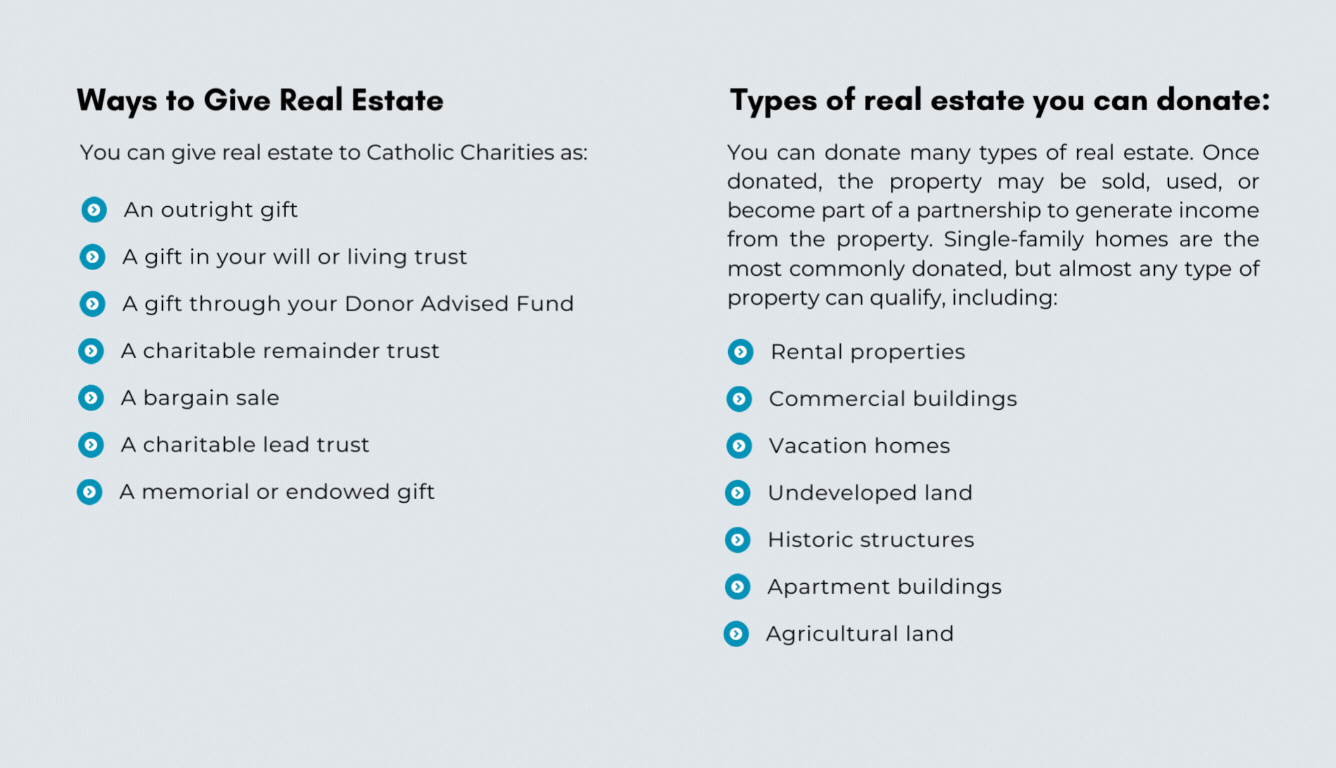Real Estate
Do you want to make a gift to Catholic Charities without touching your bank account? When most people think of giving, they imagine donating cash or writing a check, but other options can be more tax-efficient. One of the best ways to give is by donating real estate. A personal residence, vacation home, farm, commercial property, or undeveloped land can be an easy way to make a meaningful gift and can help us continue our work for years to come. A gift of real estate also helps you.
Give Property Deeds - Support Good DeedsWhen you give appreciated property you have held longer than one year, you qualify for a federal income tax charitable deduction and you may minimize or eliminate capital gains tax. You also no longer have to deal with that property's maintenance costs, property taxes, or insurance.
Depending on your particular financial and charitable goals, donating real estate to a 501(c)(3) charity such as Catholic Charities could allow you to leverage one of your most valuable investments to achieve maximum impact with your charitable giving. If you happen to own a piece of property that you’ve been thinking of selling, donating it instead could be a great way to reach your charitable giving goals and make a significant difference to the charities you support. |
What are the benefits of donating appreciated real estate held more than one year?
Donating your real estate can unlock additional funds for charity and help your financial picture by:
- Potentially eliminating the capital gains tax you would incur if you sold the real estate yourself and donated the proceeds, and increasing the amount available for charity.
- Enabling you to claim a fair market value charitable deduction for the tax year in which the gift is made (which you may choose to pass on in the form of more giving). The fair market value can be up to 30% of your adjusted gross income. This can bring meaningful savings, especially if the property is worth a significant amount of money.
- Freeing you from the hassle of selling the real estate. You can deed the property directly to Catholic Charities or ask your attorney to add a few sentences in your will or trust agreement.
- Unburdening your heirs from a complex and expensive estate plan. A donation of real estate can be a great way to simplify your estate plan. When you donate real estate, you remove it from your estate, helping to reduce your estate tax burden on your heirs.
Tips for Success:
Make sure that donating real estate is the right decision for you by considering the following:
Make sure that donating real estate is the right decision for you by considering the following:
Consult your financial advisor
A financial advisor and tax specialist can help come up with a comprehensive charitable giving plan that's right for you. While donating real estate is easier than you might think, a financial advisor may give you personalized guidance for your tax situation.
Complete the necessary paperwork
You can also ask your attorney or financial representative to submit the paperwork for you based on your financial plans.
For property worth $5,000 or less, you simply need a receipt from the charity and you must complete Section A of Form 8283 and attach it to your tax return.
For property worth more than $5,000, in addition to the receipt, you must also have the charity complete Section B of Form 8283. Additionally, you'll need to get a qualified appraisal to deduct the property's value from your taxes.
For property worth $5,000 or less, you simply need a receipt from the charity and you must complete Section A of Form 8283 and attach it to your tax return.
For property worth more than $5,000, in addition to the receipt, you must also have the charity complete Section B of Form 8283. Additionally, you'll need to get a qualified appraisal to deduct the property's value from your taxes.
Donate marketable real estate
You may consider contributing real estate to charity as long as the charity can sell the property in a timely manner (i.e., it is a marketable property and relatively easy to liquidate).
Donate property owned for more than one year
Significant appreciation maximizes the benefits of giving.
Donate property without debt
Donating property with attached debt might lower the value of your charitable deduction and the IRS may deem it a "bargain sale," in which you (or the charity) might be subject to some capital gains tax.
Transfer the property irrevocably
Catholic Charities can then negotiate the sale price and control the sale using an experienced intermediary
Avoid prearranged sales
If you have a pre-existing agreement to sell the property before donating it, the IRS might see your donation as an "anticipatory assignment of income". You then may be subject to capital gains taxes
Be aware of appraisal requirements and annual deduction limits
The limit on donating appreciated non-cash assets held more than one year is 30% of AGI. The IRS permits a carryover for five tax years, should your charitable deduction exceed AGI limits in a given tax year.
Donating real estate to a donor-advised fund or charitable remainder trust:
Donating non-cash assets such as real estate can require specialized knowledge and expertise. Many donors choose to donate through a donor-advised fund (DAF). A DAF is a type of giving vehicle that allows donors to make a charitable contribution, receive an immediate tax deduction, and then recommend grants from the fund over time, allowing donors the flexibility to support their favorite charities through a range of assets, including real estate. Please consult your financial advisor if donating through a DAF is of interest to you, and review our page on giving through a DAF here.
Contact Us by lucase978



